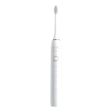
Xylitol may help prevent dental decay in humans, but the sugar substitute can be fatal for dogs. The U.S. Food and Drug Administration (FDA) warned about xylitol's potential toxicity for canines in a consumer update on July 9.
The sweetener can be found in dental products, including popular toothpastes and mouthwashes. Companies also use xylitol as a sugarless way to sweeten gum, mints, baked goods, nut butters, and medication.
When humans consume xylitol, it does not stimulate the release of insulin, one of the reasons why it's a common sugar substitute. Dogs, however, quickly absorb the sweetener into their bloodstream.
After a dog ingests xylitol, their bodies release a sometimes-potent amount of insulin. This leads to a sudden and sharp decrease in blood sugar that can be deadly if left untreated.
Symptoms of xylitol poisoning in dogs include vomiting, decreased activity, weakness, collapse, and seizures, according to the FDA, which has received several reports of dogs being poisoned by xylitol in recent years. Most often, these canines consumed sugar-free chewing gum. However, the FDA has also received reports of dogs eating "skinny" ice cream sweetened with xylitol.
The FDA recommends keeping all items that contain xylitol out of dogs' reach and only brushing canine teeth with toothpaste specifically made for pets. If a dog does eat a product containing xylitol, the administration recommends calling a vet, emergency clinic, or animal poison control center as soon as possible. The effects of xylitol poisoning can begin within 10 minutes of consumption.
Xylitol can also be deadly for ferrets, the FDA noted. Cats, however, seem spared from its effects -- most likely because of their aversion to sweets.



















